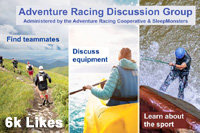Eight Ways Adventure Racing is Different From (And Better Than) Other Sports
Rob Howard / 31.07.2020
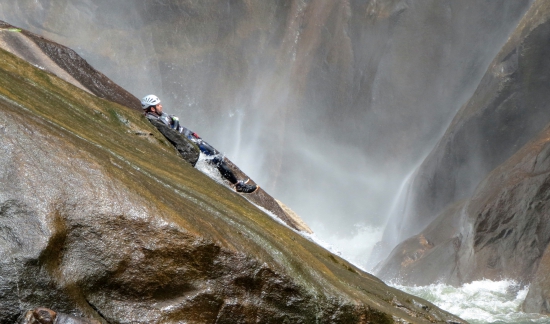
Adventure Racing is an outdoor endurance sport for teams including a combination of mountain biking, trail running/trekking, paddle sports (kayak/canoe/raft), and map and compass navigation.
- A ‘sprint’ adventure race is from 2-5 hours and a long (expedition) race anything from 3 to 10 days (non-stop). There are many other options in between those two extremes.
- Team numbers can vary. Expedition races have teams of 4, but shorter races often have classes for pairs/threes.
- An expedition race would include all of the main disciplines while a sprint race might have only three. Additional sports and challenges can be included (usually in longer races).
(This is the third in our Introduction to Adventure Racing Series.)
Adventure Racing is different to (and better than) almost every other sport because;
1. No two adventure races are alike. Every one is a new experience
‘Variety is the spice of life’ and you don’t lack that in adventure racing!
Adventure races include many sports, some dropped in just for fun, which you might not know about before the start. Race lengths are varied and so is team make-up, races move around and every course is different, seeking out the best places to go anywhere in the world, or secret corners in nearby places you thought you knew.
Every race is a new challenge. You’ll never have the perfect race, so you can always keep going out and looking for it!
2. Adventure Races move around – they could take place anywhere!
You could go to the same sports ground or run/bike the same route for a race every year (yawn) ... or you could always go somewhere new!
Adventure Racing is a sport for explorers, for those who like to be challenged, and course planners don’t just want to test them physically, they want to make them think, to surprise them, and to design a race where strategy and teamwork are as important to the outcome as speed. So they look for new places and often include new experiences, then set a course taking in the best of that location – then they move on.
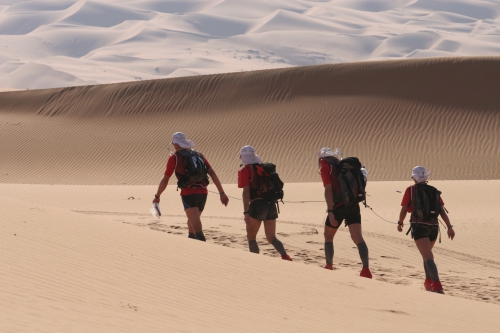
3. There is no fixed team size in Adventure Racing
Big multi-day races require teams of 4, but shorter races can be for pairs or teams of three, so however many like-minded (or hoodwinked) friends you can find to enter a race you’ll be able to get a team together and have a go!
What’s more in an adventure race you are sure to learn more about each other than in any other sports event. (Which is a good thing ... isn’t it?)
4. No Substitutions – You’re In it as a Team
Unlike most other team sports there are no substitutions in adventure racing. All of the team has to finish together to be ranked and if any member of the team drops out then the whole team is unranked.
That might sound harsh, but it’s a team sport, so the whole team has to finish. However, it is not so black and white. Partial teams can be allowed to continue by the Race Director if they feel it is safe and the race logistics can accommodate teams. And sometimes two or more partial teams join together to carry on around the course.
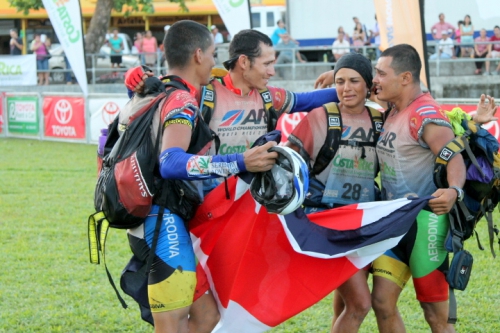
5. Adventure Races require mixed sex teams
This is one really sets adventure racing apart – is there any other sport which requires a male/female mix in a team? (All the major expedition races do, while smaller events will have a mixed category.)
Football has only recently got its head around women playing at all, while adventure racing has been a sport where men and women compete together since it first began!
The benefits of this are too many to go into here, but an adventure race is much more true to life and the teams are stronger as a result. Lots of sports talk about ‘teamwork’ but none comes close to AR where the qualities and strengths of both sexes combine to form a team.
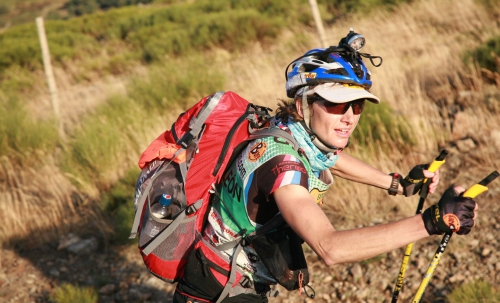
6. Adventure Races can be anything from a few hours to 10 days long
A 2-5 hour event is a ‘short’ adventure race and you wouldn’t find that in any other sport – but don’t be put off, there are lots of advantages.
For a start it means you can go at your own pace and enjoy being outdoors for longer! If you put time and effort into training for, and travelling to, a race you don’t want it to be over in no time.
Race lengths can also be half, full and 2 day events, and beyond that to multi-day expedition races, and they are worth travelling a long way to take part in – maybe right across the world!
So there is plenty of choice, every race is an experience and you can go at your own pace.
(Adventure racing is also different as race lengths are given in time – that’s because they are navigational races and you choose your own route between checkpoints.)
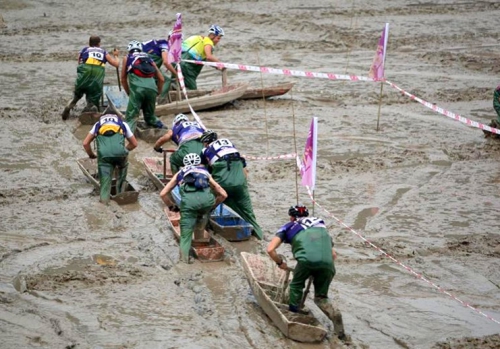
7. Adventure Races include lots of different sports and challenges
Mountain biking, trail running/walking and paddling are the main sports within adventure racing, and in longer races other sports like canyoning, climbing or rafting can be included. Navigation is important too and this means AR is a ‘thinking’ sport, and a strategic one.
The result is you are never doing the same thing all the time, and something new is always coming up. This is much better for your health and fitness than those boring ‘mono sports’ which tend to lead to mental and physical fatigue and overuse injuries. Adventure Racing also gives you a good range of skills and an excellent base fitness while at the same time letting you explore the world around you. (It’s much better than a sweaty gym surrounded by hi tech equipment!)
8. You don’t know what is coming in an Adventure Race
Life is full of surprises and so is adventure racing! It may be the only sport where you don’t find out the course you are racing until you arrive at the event, sometimes not until you’ve actually started the race!
Typically you will know the time a race is expected to take and the main sports, but until you get to the start you won’t receive the event map and full details. Sometimes these are given after the start so your planning is part of the race time, and some races give out maps and instructions in stages, so you need to complete one stage before finding out what you are doing next.
It’s another way to keep the sport exciting and to make it a varied physical and mental challenge. Once you get into adventure racing other sports will seem dull by comparison.
---------------------
If all of the above confuses you and you are wondering what the rules are and why it’s so complicated, you are not an adventure racer and should probably give triathlon or Obstacle Course Racing a go.
If it sounds exciting and intriguing you should find a few mates and have a go – and to get the conversation started you can now tell them what adventure racing is :-).
Read the first two articles in this series:
Just What is Adventure Racing? Once You Find Out You'll Be Hooked!
What is Adventure Racing? – F.A.Q. Answers to Common Questions About Adventure Racing






 SleepMonsters
SleepMonsters
